北师大版(2019)必修第二册Unit 6 The Admirable 复习课件(21张PPT)
文档属性
| 名称 | 北师大版(2019)必修第二册Unit 6 The Admirable 复习课件(21张PPT) | 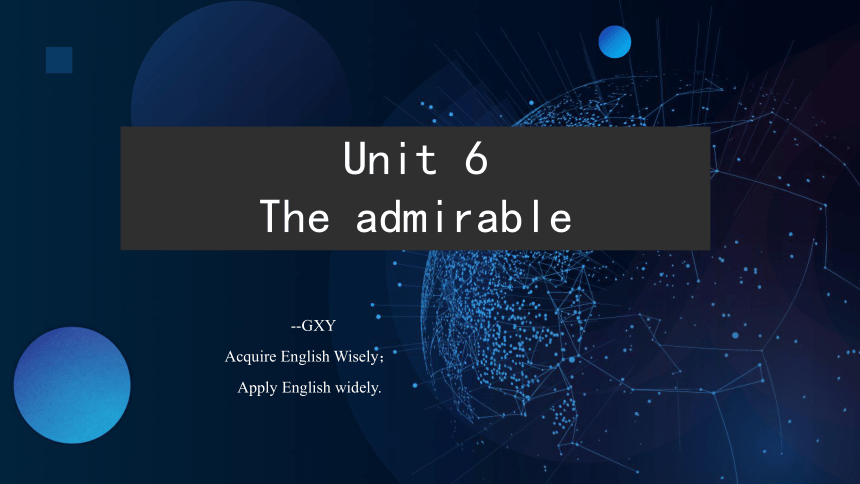 | |
| 格式 | pptx | ||
| 文件大小 | 41.7MB | ||
| 资源类型 | 教案 | ||
| 版本资源 | 北师大版(2019) | ||
| 科目 | 英语 | ||
| 更新时间 | 2023-01-09 22:20:37 | ||
图片预览

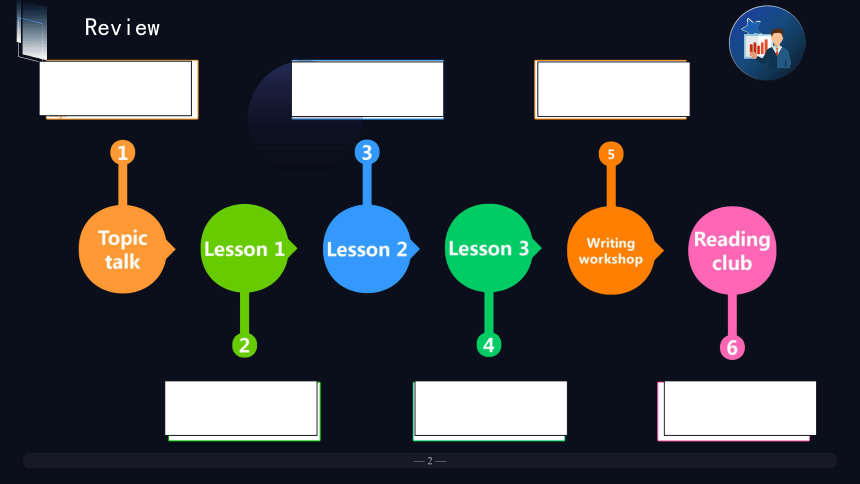

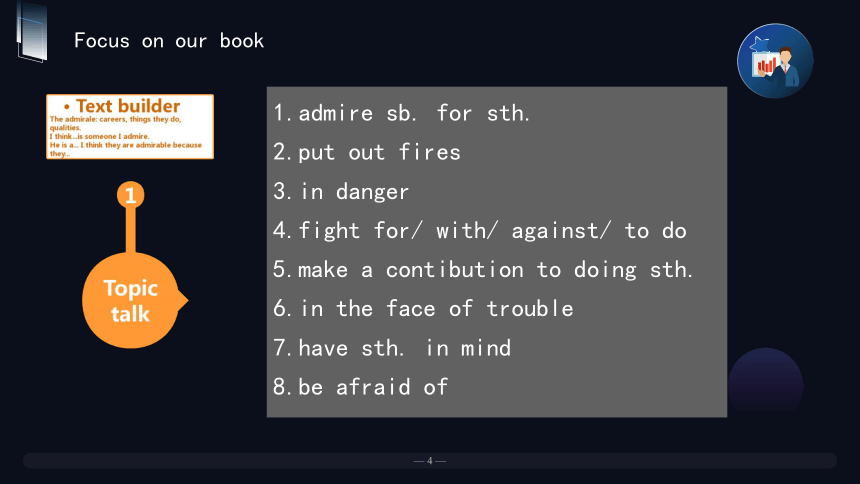
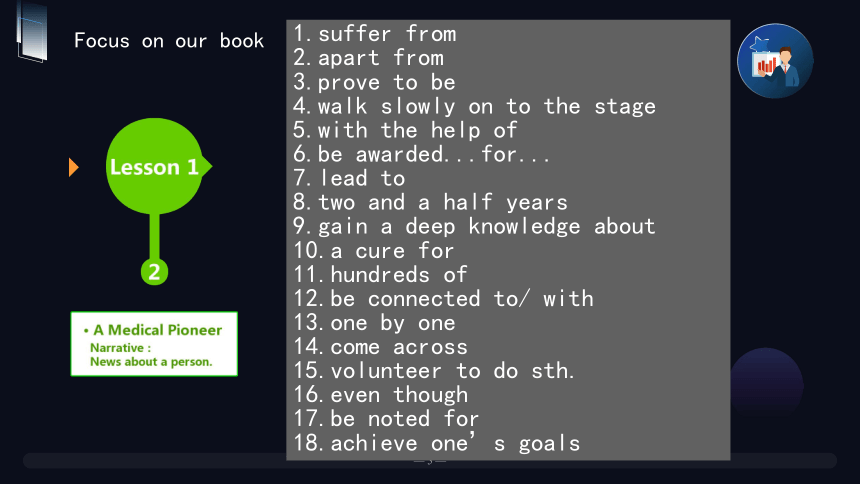
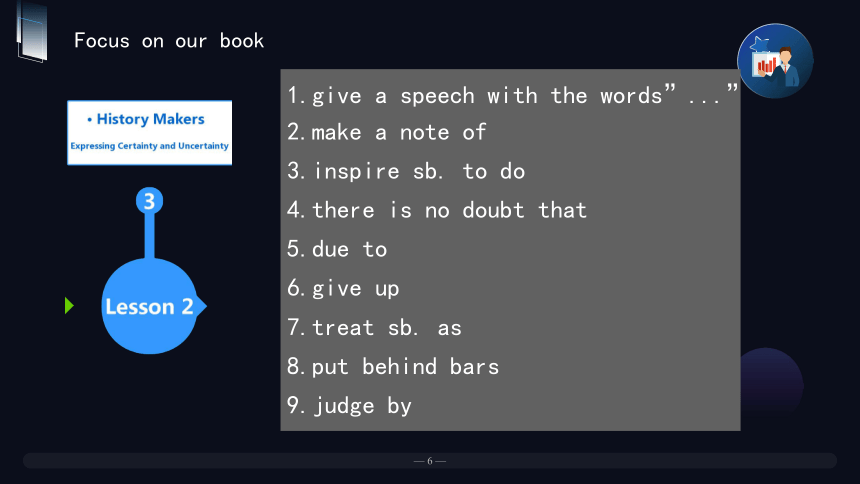
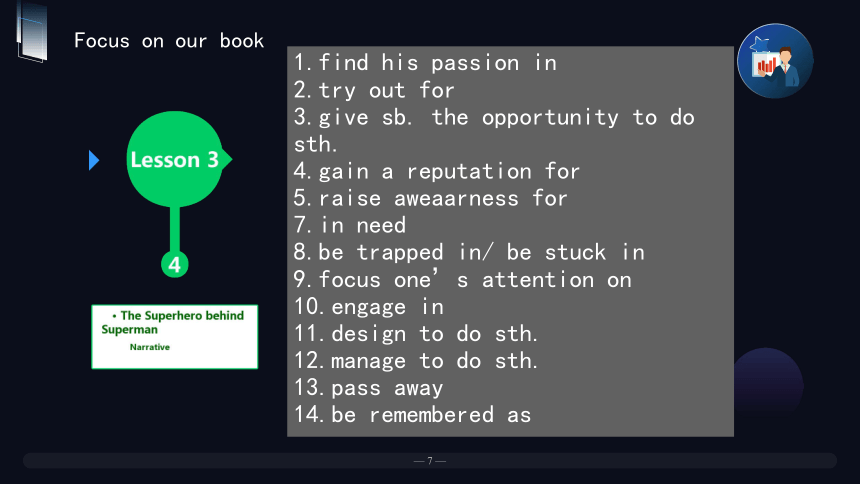
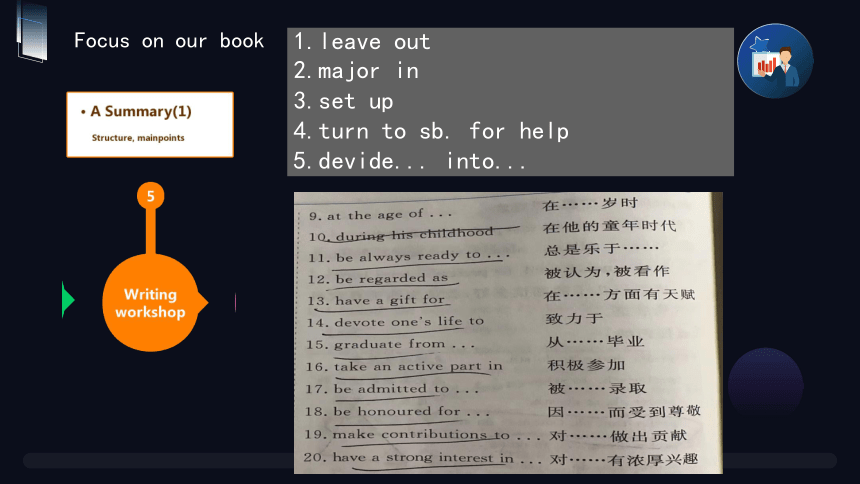
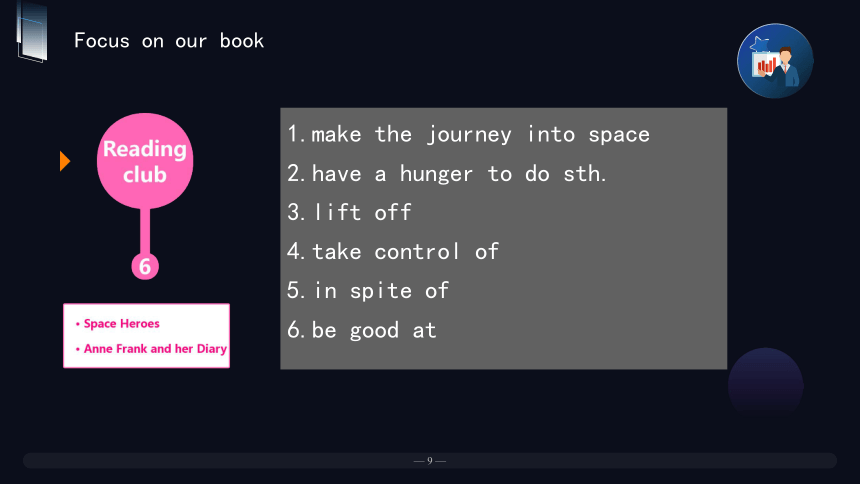
文档简介
(共21张PPT)
Unit 6
The admirable
--GXY
Acquire English Wisely; Apply English widely.
Review
Focus on our book
Focus on our book
1.admire sb. for sth.
2.put out fires
3.in danger
4.fight for/ with/ against/ to do
5.make a contibution to doing sth.
6.in the face of trouble
7.have sth. in mind
8.be afraid of
1.suffer from
2.apart from
3.prove to be
4.walk slowly on to the stage
5.with the help of
6.be awarded...for...
7.lead to
8.two and a half years
9.gain a deep knowledge about
10.a cure for
11.hundreds of
12.be connected to/ with
13.one by one
e across
15.volunteer to do sth.
16.even though
17.be noted for
18.achieve one’s goals
Focus on our book
1.give a speech with the words”...”
2.make a note of
3.inspire sb. to do
4.there is no doubt that
5.due to
6.give up
7.treat sb. as
8.put behind bars
9.judge by
Focus on our book
1.find his passion in
2.try out for
3.give sb. the opportunity to do sth.
4.gain a reputation for
5.raise aweaarness for
7.in need
8.be trapped in/ be stuck in
9.focus one’s attention on
10.engage in
11.design to do sth.
12.manage to do sth.
13.pass away
14.be remembered as
Focus on our book
1.leave out
2.major in
3.set up
4.turn to sb. for help
5.devide... into...
Focus on our book
1.make the journey into space
2.have a hunger to do sth.
3.lift off
4.take control of
5.in spite of
6.be good at
Focus on our book
Put to use
Put to use
1.However,Tu Youyou had an idea that Chinese herbs might hold the secret.
本句中的that引导同位语从句。
(1)that引导同位语从句对前面主句的内容进行解释说明。
(2)在某些名词(如 demand,wish,suggestion,
requirement等)后面的同位语从句要用虚拟语气。
(3)引导同位语从句的连词 that 通常不可省略,但在
口语中可以省去。
(4)判断是定语从句还是同位语从句可以用“加词”的方法:在名词和从句之间加入一个be动词,如果句子意思成立,则是同位语从句;否则,是定语从句。
Put to use
应用融会(完成句子)
①The news ______________________________________ is not true.
我们明天放假的消息不是真的。
②The suggestion__________________________________
came from the chairman.
采纳新规则的建议是主席提出的。
that we are having a holiday tomorrow
that the new role (should) be adopted
1.Thus, not only is he known as a superhero in the Superman films,but he is also regarded as a superhero to many in real life.
本句中not only... but also...意为“不仅……而且……”,其中 not only置于句首时,其所在分句用部分倒装。
(1)not only... but also ...用来连接两个相对称的并列成分,如主语、宾语、表语、谓语、状语,有时也可以用来连接两个句子。also有时可以省略。
(2)not only...but(also)...连接的并列成分作主语时,谓语的人称和数遵循“就近原则”,即与 but (also)后的名词或代词的数一致;either... or...,neither...nor...也有相似的用法。
(3)not only...but(also)...连接两个并列分句时,若not only...位于句首,则其后的句子要用部分倒装,but(also)后的句子不用倒装。
Put to use
Put to use
应用融会(完成句子)
Not only the children but also their teacher _________________________.
不仅孩子们,而且他们的老师也打算参加这次会议。
⑤Not only _____________________, but also it gives us heat.
太阳不仅供给我们光,而且供给我们热。
is going to attend the meeting
does the sun give us light
The sun not only gives us light, but it gives us heat.
The sun gives us not only light but also,b heat.
Grammar
Grammar:Relative Clauses(3)
定语从句(3)
介词+which/whom引导的定语从句
关系代词可作介词的宾语。通常在which和whom前加介词,即介词+which/whom结构。
●This is the shop from which I bought the book.
●He is the teacher with whom I discussed my project.
介词的选用或依据定语从句修饰的名词或代词,或依据从句中的相关动词。
. The train on which I'm travelling is for Shanghai. (travel on the train)
. This is the professor from whom I've learnt a lot. (learn from sb)
·She's doing an important project about which I know little. (know about sth)
. Have you seen the telescope with which I studied the sky (study with the telescope)
Grammar:Relative Clauses(3)
但是在日常英语中,通常把介词放在从句的句末,省略关系代词which或whom。
● The train (which) I'm travelling on is for Shanghai.
● This is the professor (whom) I've learnt a lot from.
● She's doing an important project(which)I know little about.
● Have you seen the telescope (which) I studied the sky with
Grammar:Relative Clauses(3)
Synonyms and Antonyms 同义词和反义词
同义词是意义几乎相同的一组词语,它们词性相同。
●job (n.); career (n.) ● finally (adv.); eventually (adv.)
● severe (adj.); serious (adj.)
反义词是意义相反的一组词语。和同义词一样,它们词性相同。
·healthy(adj.); sick(adj.) ·positive(adj.); negative(adj.)
·alive(ad); dead(adj)
词根加上前缀或后缀构成反义词。前缀有im-,in-,un-等,如im-(e.g.improper), in-(e.g.incorrect), un-(e.g.untidy),后缀有-less等,如ghopelessness 。
Grammar:Synonyms and Antonyms 同义词和反义词
Homework
整理、背诵并听写课件中的重点词组;
完成课本68-70页,86-87页。
Thank you for listening!
Unit 6
The admirable
--GXY
Acquire English Wisely; Apply English widely.
Review
Focus on our book
Focus on our book
1.admire sb. for sth.
2.put out fires
3.in danger
4.fight for/ with/ against/ to do
5.make a contibution to doing sth.
6.in the face of trouble
7.have sth. in mind
8.be afraid of
1.suffer from
2.apart from
3.prove to be
4.walk slowly on to the stage
5.with the help of
6.be awarded...for...
7.lead to
8.two and a half years
9.gain a deep knowledge about
10.a cure for
11.hundreds of
12.be connected to/ with
13.one by one
e across
15.volunteer to do sth.
16.even though
17.be noted for
18.achieve one’s goals
Focus on our book
1.give a speech with the words”...”
2.make a note of
3.inspire sb. to do
4.there is no doubt that
5.due to
6.give up
7.treat sb. as
8.put behind bars
9.judge by
Focus on our book
1.find his passion in
2.try out for
3.give sb. the opportunity to do sth.
4.gain a reputation for
5.raise aweaarness for
7.in need
8.be trapped in/ be stuck in
9.focus one’s attention on
10.engage in
11.design to do sth.
12.manage to do sth.
13.pass away
14.be remembered as
Focus on our book
1.leave out
2.major in
3.set up
4.turn to sb. for help
5.devide... into...
Focus on our book
1.make the journey into space
2.have a hunger to do sth.
3.lift off
4.take control of
5.in spite of
6.be good at
Focus on our book
Put to use
Put to use
1.However,Tu Youyou had an idea that Chinese herbs might hold the secret.
本句中的that引导同位语从句。
(1)that引导同位语从句对前面主句的内容进行解释说明。
(2)在某些名词(如 demand,wish,suggestion,
requirement等)后面的同位语从句要用虚拟语气。
(3)引导同位语从句的连词 that 通常不可省略,但在
口语中可以省去。
(4)判断是定语从句还是同位语从句可以用“加词”的方法:在名词和从句之间加入一个be动词,如果句子意思成立,则是同位语从句;否则,是定语从句。
Put to use
应用融会(完成句子)
①The news ______________________________________ is not true.
我们明天放假的消息不是真的。
②The suggestion__________________________________
came from the chairman.
采纳新规则的建议是主席提出的。
that we are having a holiday tomorrow
that the new role (should) be adopted
1.Thus, not only is he known as a superhero in the Superman films,but he is also regarded as a superhero to many in real life.
本句中not only... but also...意为“不仅……而且……”,其中 not only置于句首时,其所在分句用部分倒装。
(1)not only... but also ...用来连接两个相对称的并列成分,如主语、宾语、表语、谓语、状语,有时也可以用来连接两个句子。also有时可以省略。
(2)not only...but(also)...连接的并列成分作主语时,谓语的人称和数遵循“就近原则”,即与 but (also)后的名词或代词的数一致;either... or...,neither...nor...也有相似的用法。
(3)not only...but(also)...连接两个并列分句时,若not only...位于句首,则其后的句子要用部分倒装,but(also)后的句子不用倒装。
Put to use
Put to use
应用融会(完成句子)
Not only the children but also their teacher _________________________.
不仅孩子们,而且他们的老师也打算参加这次会议。
⑤Not only _____________________, but also it gives us heat.
太阳不仅供给我们光,而且供给我们热。
is going to attend the meeting
does the sun give us light
The sun not only gives us light, but it gives us heat.
The sun gives us not only light but also,b heat.
Grammar
Grammar:Relative Clauses(3)
定语从句(3)
介词+which/whom引导的定语从句
关系代词可作介词的宾语。通常在which和whom前加介词,即介词+which/whom结构。
●This is the shop from which I bought the book.
●He is the teacher with whom I discussed my project.
介词的选用或依据定语从句修饰的名词或代词,或依据从句中的相关动词。
. The train on which I'm travelling is for Shanghai. (travel on the train)
. This is the professor from whom I've learnt a lot. (learn from sb)
·She's doing an important project about which I know little. (know about sth)
. Have you seen the telescope with which I studied the sky (study with the telescope)
Grammar:Relative Clauses(3)
但是在日常英语中,通常把介词放在从句的句末,省略关系代词which或whom。
● The train (which) I'm travelling on is for Shanghai.
● This is the professor (whom) I've learnt a lot from.
● She's doing an important project(which)I know little about.
● Have you seen the telescope (which) I studied the sky with
Grammar:Relative Clauses(3)
Synonyms and Antonyms 同义词和反义词
同义词是意义几乎相同的一组词语,它们词性相同。
●job (n.); career (n.) ● finally (adv.); eventually (adv.)
● severe (adj.); serious (adj.)
反义词是意义相反的一组词语。和同义词一样,它们词性相同。
·healthy(adj.); sick(adj.) ·positive(adj.); negative(adj.)
·alive(ad); dead(adj)
词根加上前缀或后缀构成反义词。前缀有im-,in-,un-等,如im-(e.g.improper), in-(e.g.incorrect), un-(e.g.untidy),后缀有-less等,如ghopelessness 。
Grammar:Synonyms and Antonyms 同义词和反义词
Homework
整理、背诵并听写课件中的重点词组;
完成课本68-70页,86-87页。
Thank you for listening!
同课章节目录
- Unit 4 Information technology
- Lesson 1 Avatars
- Lesson 2 Apps
- Lesson 3 Internet and Friendships
- Unit 5 Humans and nature
- Lesson 1 A Sea Story
- Lesson 2 Professional Rescue Team
- Lesson 3 Race to the Pole
- Unit 6 The admirable
- Lesson 1 A Medical Pioneer
- Lesson 2 History Makers
- Lesson 3 The Superhero Behind Superman
